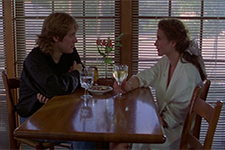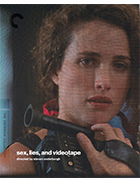sex, lies, and videotape [Blu-Ray]
|
 When talking about American independent cinema, there is before Steven Soderbergh's sex, lies, and videotape and after. Debuting at the Sundance Film Festival in 1989, Soderbergh's debut feature, shot for just over $1.25 million when he was 26 years old and starring a quartet of recognizable, but young and hardly bankable actors, took audiences by storm. Its scandalous-sounding title intrigued viewers and drew them it, but it was ultimately Soderbergh's thoughtful and absorbing portrait of unconventional human relationships that kept them in their seats and talking about it afterwards.
When talking about American independent cinema, there is before Steven Soderbergh's sex, lies, and videotape and after. Debuting at the Sundance Film Festival in 1989, Soderbergh's debut feature, shot for just over $1.25 million when he was 26 years old and starring a quartet of recognizable, but young and hardly bankable actors, took audiences by storm. Its scandalous-sounding title intrigued viewers and drew them it, but it was ultimately Soderbergh's thoughtful and absorbing portrait of unconventional human relationships that kept them in their seats and talking about it afterwards.
When the film took the top prize at the Cannes Film Festival several months later (the jury was headed by Wim Wenders), it marked the beginning of what would become a veritable flood of new American talent making personal films that stood in stark contrast to the prefabricated blockbuster cinema that Hollywood had all but perfected during the previous decade (the year that sex, lies, and videotape debuted, the top three films at the U.S. box office were Batman, Indiana Jones and the Last Crusade, and Lethal Weapon 2). It was, in many ways, like the early 1970s all over again, with names like Spike Lee, Quentin Tarantino, Kevin Smith, and the Coen Brothers suddenly dominating discussions of American film and taking home numerous international prizes (three of the next five winners of the Palm d'Or were American films: David Lynch's Wild at Heart in 1990, the Coens' Barton Fink in 1991, and Tarantino's Pulp Fiction in 1994). It was an auspicious beginning for Soderbergh, to be sure, even though it took him a while to find a balance between his outsider-artist predilections for highly personal filmmaking and the demands of staying relevant in the Hollywood game (his next four feature films, 1991's Kafka, 1993's King of the Hill, 1995's Underneath, and 1996's Schizopolis, didn't immediately connect with audiences and were considered disappointments). Nevertheless, sex, lies, and videotape marked the arrival of a bold new talent, made all the more impressive by the film's lack of self-consciously showy aesthetics, which so many independent debuts tend to wallow in (as Soderbergh has put it, it's hard to resist putting all your tricks into your first film because you don't know if you'll ever get to make another). In this regard, sex, lies is a film of great restraint, with Soderbergh and cinematographer Walt Lloyd (who also shot Kafka) maintaining a simple and direct visual aesthetic to compliment the economically scaled nature of the storyline (one could easily imagine it as a stage play) and the power of the film's four central performances. Each of the four main characters, all of whom are in their early 30s, has roughly equal narrative weight, so there is no one protagonist on which we can fixate. Rather, Soderbergh spreads our attention around, which emphasizes the interconnections among the characters, each of whom has his or her own unique hang-ups and problems. James Spader's Graham Dalton is the catalyst character, the one who enters the lives of the others and upsets the tenuous balance of their lives (the fact that said tenuous balance is based entirely on lies suggests that it needed to be upset). Graham is an old college friend of John Mullany (Peter Gallagher), a successful lawyer and general cad who is engaged in a torrid affair with Cynthia Bishop (Laura San Giacomo), the younger sister of his wife Ann (Andie MacDowell). Ann and Cynthia couldn't be any more different: Whereas Ann is reserved, quiet, and, one might say, repressed, Cynthia is extroverted, loud, and hypersexualized. John is essentially torn between them, wanting to have his cake and eat it, too: He clearly enjoys the stability and domesticity that Ann supplies (he made her quit his job and stay at home even though they have no children), but he also desires the unrestrained carnality that Cynthia has in spades. Graham is something of an enigma. Arriving in a beat-up convertible with everything he owns packed in the trunk, he is an independent spirit who doesn't want to be tied down ("I only want to have one key," he says). Yet, as Soderbergh eventually shows, his supposed freedom is really its own trap because he is incapable of forming healthy relationships. This is partially because, as he freely admits to Ann, he is impotent in the presence of others, but Spader's off-beat performance (which won him the actor's prize at Cannes) hints at a fundamental disconnect, which he tries to bridge by videotaping women talking about their sexuality. This provides him with the sexual release he cannot attain in the presence of another, but it also allows him to connect intimately with his "subjects" as he gently interrogates their history, preferences, fantasies, and so on; their confessional, rather than physical, openness is his turn-on. The fact that the connection is inherently limited, with its memory being encased on magnetic tape, underscores Graham's solitude in the world. Soderbergh handles the intricacies and complications of the characters masterfully. Despite their issues, each character comes across as fundamentally human, and even if we can't imagine being in their shoes, we can understand on some level why they are the way they are. Introduced spinning his wedding ring on the desk in his massive office, John is clearly a Reagan-era "Master of the Universe" stripped down to his narcissistic bones, while Ann reminds us that social niceties and a gentle nature are often just the surface masking of deep insecurity. And, while we might shake our heads in disgust that Cynthia would sleep with her sister's husband, it is hard not to feel compelled by her passions and her undiluted acceptance of her own nature. The same can be said for Graham, who strives at all times to be "honest," partially as a means of making up for his past transgressions. Soderbergh weaves the lives of these characters together in consistently fascinating ways, binding scenes together with overlapping dialogue and visual matches that remind us of the power of emotional interconnections, even those of which we're not entirely aware.
Copyright ©2018 James Kendrick Thoughts? E-mail James Kendrick All images copyright © Criterion Collection | |||||||||||||||||||||||||||||||
Overall Rating:



 (3.5)
(3.5)
Subscribe and Follow
Get a daily dose of Africa Leader news through our daily email, its complimentary and keeps you fully up to date with world and business news as well.
News RELEASES
Publish news of your business, community or sports group, personnel appointments, major event and more by submitting a news release to Africa Leader.
More Information
